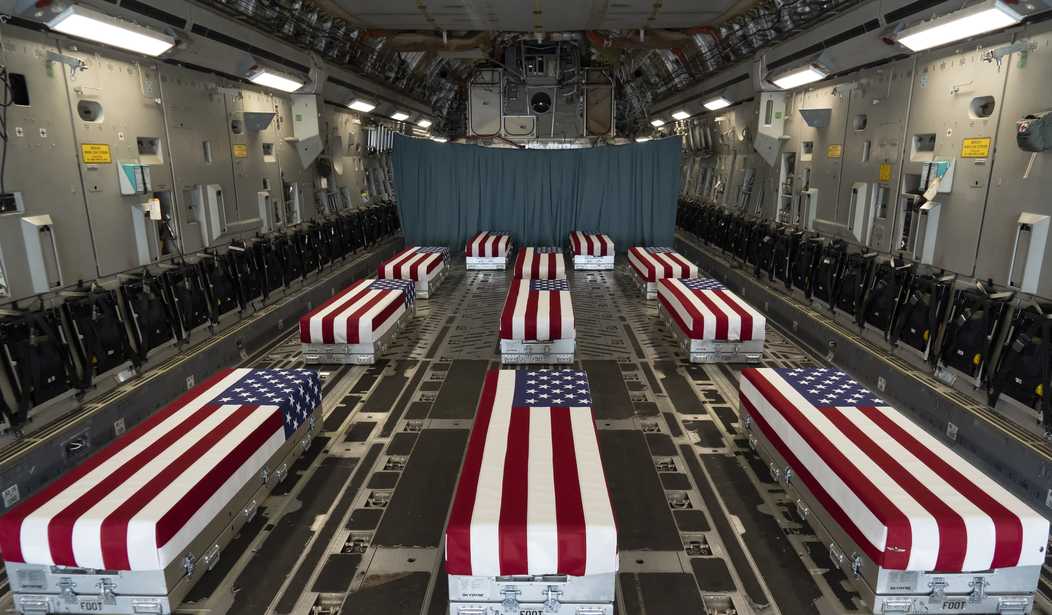U.S. troops and veterans who helped to evacuate Afghans during President Joe Biden's botched withdrawal in 2021 recalled harrowing details while testifying during the first hearing of the GOP-controlled House Foreign Affairs Committee's investigation.
Among the witnesses was Tyler Vargas-Andrews, a Marine sergeant who watched 13 U.S. troops get killed by a suicide bomber.
Vargas-Andrews began his testimony by claiming he identified the suicide bomber but was denied permission to shoot him down, as Townhall reported previously, leaving him with an amputated leg and arm and the loss of his left kidney and parts of his intestines and colon.
"Plain and simple, we were ignored," Vargas-Andrews said. "My body was overwhelmed by the trauma of the blast. My abdomen had been ripped open. Every inch of my exposed body except for my face took ball bearings and shrapnel."
He and his sniper team were assigned to the Hamid Karzai International Airport's Abbey Gate, where he processed thousands of Afghans fleeing their country while turning away thousands of others. He and his team also monitored the Taliban and other terrorist activity outside the gate.
However, during his emotional testimony, Vargas-Andrews said that the State Department was unwilling to help control the chaos. While recounting the event, he paused several times to choke back tears.
"People suffered from extreme malnutrition, dehydration, heat casualties, and infants were dying. Afghans brutalized and tortured by the Taliban flocked to us pleading for help," Vargas-Andrews said. "Some Afghans turned away from HKIA and tried to kill themselves on the razor wire we used as a deterrent. They thought this was merciful compared to the Taliban torture they faced. As a result, countless Afghans were murdered by the Taliban 155 yards in front of our position day and night."
Recommended
On August 22, either ISIS or the Taliban conducted a "test run" using an improvised explosive device (IED) for a terror attack. Four days later, Vargas-Andrew's team identified the bomber who fit the description and "consistently and nervously" kept looking at the Marines stationed near the gate.
On a second request to take the suspect out, the battalion commander came to the airport to see the bomber himself, replying, "I don't know" if they had the authority to do it.
"Myself and my team leader asked very harshly, 'Well, who does? Because this is your responsibility, sir,'" Vargas-Andrews said, adding, "we received no update and never got our answer. Eventually, the individual disappeared. To this day, we believe he was the suicide bomber."
Within hours a bomb erupted outside Abbey Gate, killing at least 170 Afghan civilians and 13 U.S. service members.
"Our military members and veterans deserve our best because that is what we give to America," Vargas-Andrews said, concluding his testimony. "The withdrawal was a catastrophe, in my opinion, and there was an inexcusable lack of accountability and negligence. The eleven Marines, one Sailor, and one Soldier murdered that day have not been answered for."
Also testifying was Aidan Gunderson, a former Army specialist who served as a medic deployed to the Hamid Karzai International Airport during the Afghanistan withdrawal.
Following the bombing, Gunderson described the horror he encountered, recalling that "an injured Marine with blood-soaked pants squeeze[d] my hand as tightly as he could and looked into my eyes, yelling, 'I don't want to die.'"
"I reassured him that he would be fine, but as they carried him inside, I did not know if he would survive," Gunderson said. "Departing on August 31 on one of the last flights out of the country, I was relieved to be headed home, but I wondered how the horror I just witnessed changed me, how it would change us all. I can assure you that it has."
Emotional testimony from Sgt. Vargas-Andrews on suicide bombing outside of Kabal airport: "I opened my eyes to marines dead or unconscious lying around me...The withdrawal was a catastrophe in my opinion. There was an inexcusable lack of accountability. and negligence." pic.twitter.com/9DLr9LGP8u
— CSPAN (@cspan) March 8, 2023

























Join the conversation as a VIP Member